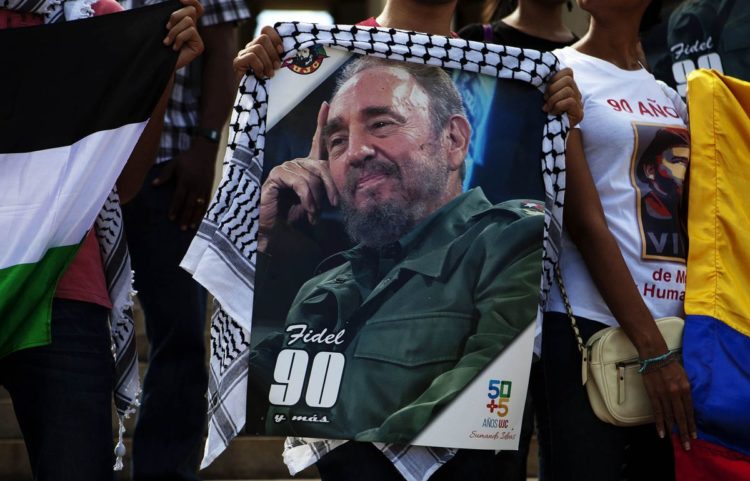Fidel Castro, Antonin Scalia, John Gutfreund: The Year in Deaths

(Bloomberg) —Former Cuban leader Fidel Castro, U.S. Supreme Court Justice Antonin Scalia and ex-Salomon Brothers executive John Gutfreund were among newsmakers in business, finance and public affairs who died in 2016.
The business world lost Andy Grove, a refugee from postwar Europe who started Intel Corp.; Forrest Mars Jr., the billionaire co-owner of candy maker Mars Inc.; Dwayne Andreas, who built Archer-Daniels-Midland Co. into the world’s largest processor of agricultural products; and Roger Enrico, who led PepsiCo Inc. in its battle against Coca-Cola Co.
Financial leaders who died included Thomas Perkins, the venture capitalist who helped finance Amazon.com and Google Inc.; Robert H.B. Baldwin, who led Morgan Stanley during a period of rapid growth; and E. Lee Hennessee, who started a hedge-fund advisory firm when few women worked in that part of the industry.
Deceased government leaders include Shimon Peres, Israel’s former president and prime minister whose political career spanned more than six decades; King Bhumibol Adulyadej of Thailand, who reigned when his nation became an economic power in Southeast Asia; and former U.S. first lady Nancy Reagan, who supported and advised Ronald Reagan during his rise from actor to president.
Here are the year’s notable deaths, with each name linked to a previously published obituary. A cause of death is provided when known.
January
Dale Bumpers, 90. Four-term U.S. senator from Arkansas who capped an almost 30-year political career by delivering the closing statement in President Bill Clinton’s impeachment defense in 1999. Died Jan. 1 at his home in Little Rock, Arkansas.
Mike Oxley, 71. The Ohio Republican served 12 terms in the U.S. House of Representatives and was best known for co-sponsoring the landmark Sarbanes-Oxley Act requiring corporate executives to vouch for company financials after the Enron Corp. and WorldCom Inc. accounting scandals. Died Jan. 1 in McLean, Virginia, of non-small cell lung cancer, which can afflict non-smokers.
John Angelo, 74. He co-founded Angelo, Gordon & Co. and presided 27 years over the New York investment firm’s growth to $26 billion in assets under management. Died Jan. 1 of cancer.
Robert H.B. Baldwin, 95. As Morgan Stanley’s president and then chairman, he guided the bank from 1973 to 1983, a period of rapid growth and expansion into trading, money management and mergers and acquisitions. Died Jan. 3 of pneumonia at a nursing facility in Skillman, New Jersey.
Donald Ross Sr., 90. Former chief executive officer at New York Life Insurance Co. who doubled the company’s total assets by adding mutual funds in the 1980s while shunning junk bonds. Died Jan. 5 at his home in Franklin Lakes, New Jersey.
Richard Abramson, 70. Helped build AllianceBernstein Holding LP’s institutional advisory business during his almost four decades at the New York-based investment firm. Died Jan. 17 of multiple myeloma, a form of cancer, at his home in Manhattan.
Mustafa Vehbi Koc, 55. Billionaire chairman of Koc Holding AS, Turkey’s biggest group of companies. Died Jan. 21. at a hospital in Istanbul of a heart attack.
Anton-Wolfgang von Faber-Castell, 74. He led Faber-Castell AG, the centuries-old German maker of the humble pencil used in classrooms around the world and added a line of jewel-encrusted pens. Died Jan. 21 in Houston.
John Stewart Bryan III, 77. The last of an American newspaper-publishing family to serve as head of Media General Inc., he oversaw its move into broadcasting. Died Jan. 23 at Bon Secours St. Mary’s Hospital in Richmond, Virginia, after sustaining injuries in a fall.
February
Edgar Mitchell, 85. U.S. astronaut who walked on the moon in 1971, a transformative experience that spurred him to explore the meaning of life and consciousness. Died Feb. 4 at a hospice facility in West Palm Beach, Florida.
Drew Lewis, 84. A corporate turnaround specialist who was the U.S. transportation secretary when President Ronald Reagan fired striking air traffic controllers. Died Feb. 10 in Prescott, Arizona, of complications from pneumonia.
Antonin Scalia, 79. The sharp-tongued U.S. Supreme Court justice who sought to limit constitutional protections to those envisioned by the nation’s founders. He was found dead Feb. 13 at a resort in West Texas and had a history of heart trouble.
John Riccardo, 91. He changed the course of Chrysler Corp. in the late 1970s by hiring Lee Iacocca to succeed him and requesting the government loan guarantees that helped save the automaker. Died Feb. 13 in Ann Arbor, Michigan.
Boutros Boutros-Ghali, 93. Egyptian diplomat who served as United Nations secretary-general in the early 1990s, faced genocides in Rwanda and Bosnia and was denied a second term due to friction with President Bill Clinton’s administration. Died Feb. 16 in an Egyptian hospital.
Harper Lee, 89. The American author whose book “To Kill a Mockingbird” was voted the best novel of the 20th century and became a classroom standard for the study of racial injustice in the U.S. Died Feb. 19 at an assisted-living facility in Monroeville, Alabama.
Peter Mondavi, 101. He ran the family’s Charles Krug Winery in California’s Napa Valley while his brother, Robert, left the company to start his own Robert Mondavi Winery. Died Feb. 20 at his home in St. Helena, California.
Alfred Mann, 90. Physicist and inventor who founded more than a dozen companies to sell pioneering biomedical devices such as the first rechargeable pacemaker, an artificial retina and inhalable insulin. Died Feb. 25 in Las Vegas.
March
Aubrey McClendon, 56. The one-time billionaire wildcatter whose meteoric rise and swift fall at Chesapeake Energy Corp. traced the arc of the shale revolution. Died March 3 in a car crash in Oklahoma City, several hours after he was charged with rigging bids for oil and natural gas leases.
Nancy Reagan, 94. Former actress and first lady who nurtured the political career of husband Ronald Reagan, and was remembered for her unstinting devotion to the president as well as efforts to battle drug abuse and Alzheimer’s disease. Died March 6 of congestive heart failure at her home in the Los Angeles neighborhood of Bel Air.
John Gutfreund, 86. He was proclaimed the “King of Wall Street” in 1985 for harnessing the egos and fiefdoms of Salomon Brothers into one of the most profitable investment-banking firms, only to be deposed as CEO after a 1991 trading scandal. Died March 9 of pneumonia at New York Presbyterian/Weill Cornell Medical Center in New York.
Ralph Larsen, 77. Former CEO at Johnson & Johnson whose strategy of growth through acquisitions propelled the company to become the nation’s fourth-largest maker of prescription drugs and the world’s biggest provider of medical supplies and devices by the time he stepped down in 2002. Died March 9 of cardiac arrest at his home in Naples, Florida.
Serge Kampf, 81. The founder of Paris-based Cap Gemini SA who turned a network of French programmers into one of the world’s largest providers of information-technology services. Died March 15 in his native French town of Grenoble after a long illness.
Andy Grove, 79. He escaped the ruins of postwar Europe to become a founder of Intel Corp. and one of the architects of Silicon Valley’s growth into the world’s center of technology creation. Died March 21.
Leon Charney, 77. Billionaire owner of Manhattan real estate whose holdings included three skyscrapers in Times Square and also hosted a New York City public television show focused on the Middle East and Jewish affairs. Died March 21.
Rob Ford, 46. He catapulted into the international spotlight after admitting he smoked crack cocaine while mayor of Toronto. Died March 22 at Mount Sinai Hospital in Toronto after he was diagnosed with liposarcoma, a rare type of cancer.
Hans-Dietrich Genscher, 89. Germany’s longest-serving foreign minister, who helped negotiate the reunification of East and West Germany in 1990 at the end of the Cold War. Died March 31 of heart failure at his home near Bonn.
April
Seth Glickenhaus, 102. A bond trader turned money manager who spent more than eight decades on Wall Street and managed his investments until the day of his death. Died April 16 at home in New Rochelle, New York.
Bill Campbell, 75. A marketing executive at Apple Inc. in the 1980s and CEO at financial-software firm Intuit in the 1990s, he became a widely admired Silicon Valley coach and mentor whose homespun advice on leadership and management nurtured a range of Silicon Valley luminaries including Apple co-founder Steve Jobs and Google co-founder Larry Page. Died April 18 of cancer.
Patricio Aylwin, 97. Former president of Chile who led the nation’s transition to democracy from dictatorship in 1990, following 17 years of military rule by Augusto Pinochet. Died April 19 at his home in Santiago.
May
Walter Weiner, 85. The lawyer for international financier Edmond Safra, whose first job as a banker was serving as CEO at Safra’s Republic New York Corp. which he ran for almost two decades. Died May 5 of Parkinson’s disease at his home in New York City.
Daniel Tully, 84. Former Merrill Lynch & Co. chairman and CEO who spoke out as both critic and cheerleader as the firm tried to weather the 2008 mortgage crisis. Died May 10 in Darien, Connecticut.
Jack Treynor, 86. His insights into risk and return underpin theories for investment pricing and shaped the field of quantitative finance. Died May 11, in Harbor City, California.
Martin Senn, 59. Ex-CEO at Zurich Insurance Group AG who stepped down in December 2015 following a corporate reshuffle after five years on the job. Died May 27 from self-inflicted wounds.
June
Roger Enrico, 71. As CEO at PepsiCo Inc., he used a sponsorship deal with Michael Jackson to almost pull even in the marketplace with Coca-Cola Co. Died June 1, while snorkeling in the Cayman Islands, where he had a home.
Muhammad Ali, 74. Brash, fleet-footed heavyweight boxing champion whose charisma transcended sports and made him a global symbol of social change. Died June 3 in a Phoenix -area hospital after suffering from Parkinson’s disease, a neurological affliction that some doctors attributed to the numerous blows to the head he took during two decades as a boxer.
Theodore Dimon, 85. Veteran Wall Street broker and father of James Dimon, chairman and CEO at JPMorgan Chase & Co. Died June 5 of cancer.
Thomas Perkins, 84. Co-founder of venture-capital firm Kleiner Perkins Caufield & Byers who provided early financing to technology giants such as Google Inc., Amazon.com Inc. and Sun Microsystems Inc. Died June 7 at his home in Tiburon, California, following a long illness.
Jo Cox, 41. Elected to parliament in 2015, she was the first British lawmaker to be murdered since Ian Gow was killed by the IRA in 1990. Died June 16 from gunshot wounds sustained while working for her constituents in West Yorkshire.
Sanjay Valvani, 44. A partner at Visium Asset Management who was charged with insider trading. Found dead June 20 of self-inflicted wounds at his home in Brooklyn, New York.
Simon Ramo, 103. The scientist, engineer and entrepreneur who co-founded two Fortune 500 companies and was chief scientist for the U.S. intercontinental ballistic missile system during the Cold War. Died June 27 at his home in Santa Monica, California.
Alvin Toffler, 87. The U.S. author whose visions of accelerating social change guided Chinese leaders, American politicians and business moguls through the best-selling books “Future Shock” and “The Third Wave.” Died June 27 at his home in Los Angeles.
July
Irving Pollack, 98. He established the U.S. Securities and Exchange Commission’s enforcement division as its founding director in 1972. Died July 1 at his home in Rockville, Maryland.
Michel Rocard, 85. Served as prime minister of France under President Francois Mitterrand and was a leader of the nation’s Socialist Party. Died July 2.
Jack Taylor, 94. He became a billionaire by renting cars to Americans where they lived through the company he named Enterprise, after the aircraft carrier from which he flew planes during World War II. Died July 2 in St. Louis after a brief illness.
Elie Wiesel, 87. Nobel Peace Prize winner whose acclaimed books chronicled his tortured memories of human cruelty in the Nazi concentration camps that killed his parents and younger sister. Died July 2 at his home in New York.
Forrest Mars Jr., 84. The heir and billionaire co-owner of Mars Inc. who helped oversee the U.S. candy maker’s global drive into new markets for M&M’s, Milky Way bars and Uncle Ben’s rice. Died July 26 in Seattle of a heart attack.
August
James Peter Morrow, 68. An American banker and financial consultant who led the restructuring of Mongolia’s Khan Bank before its privatization. Died Aug. 4 at a hospital in the U.S.
Richard Holland, 95. The Nebraska advertising executive who helped link up one of the great partnerships in business history, the one between Berkshire Hathaway Inc. Chairman Warren Buffett and his deputy, Charles Munger. Died Aug. 9 at his home in Omaha.
Gerald Cavendish Grosvenor, 64. Known as the Duke of Westminster, his central London property holdings made him the U.K.’s wealthiest native-born person. Died Aug. 9 at the Royal Preston Hospital in Lancashire.
Joao Havelange, 100. The second-longest serving head of FIFA transformed soccer’s governing body into a global business worth billions and the center of corruption allegations. Died Aug. 16 at Samaritano Hospital in Rio de Janeiro.
John McLaughlin, 89. Talk-show host whose rowdy panel discussions on political issues entertained U.S. television viewers for more than 30 years and drew comparisons to professional wrestling. Died Aug. 16 at his home in Washington.
Jay Fishman, 63. Chairman and former CEO of Travelers Cos. who steered the insurer through the 2008 financial crisis and into the Dow Jones Industrial Average. Died Aug. 19 at his home in New Jersey, after suffering from amyotrophic lateral sclerosis, or ALS, and was replaced as CEO in 2015.
Bonnie Baha, 56. A U.S. bond portfolio manager who helped Jeffrey Gundlach turn Los Angeles-based DoubleLine Capital into a $100 billion asset management firm. Died Aug. 21 at the University of Virginia Medical Center in Charlottesville, Virginia, after she was struck by a car.
Reinhard Selten, 85. German economist and mathematician who won the 1994 Nobel Prize for his work on game theory. Died Aug. 23 in the Polish city of Poznan.
Walter Scheel, 97. A former West German president who encouraged the nation to come to terms with its World War II legacy and battled the wave of terror unleashed by the Red Army Faction during the 1970s. Died Aug. 24 in a nursing home in Bad Krozingen, Germany.
September
Carlos Bulgheroni, 71. He helped lead Argentina’s Bridas Corp. to become a global operator in energy and was known as one of the country’s most politically astute businessmen. Died Sept. 3 in the U.S. following surgery.
Phyllis Schlafly, 92. The lawyer, author, mother and bane of the U.S. feminist movement who led the resistance that blocked the Equal Rights Amendment to the U.S. Constitution. Died Sept. 5 of cancer at her home in St. Louis.
Michel Bergerac, 84. He led Revlon Inc.’s diversification into health care and lost control of the cosmetics maker in a three-month battle with investor Ronald Perelman. Died Sept. 11 of respiratory failure at New York-Presbyterian Hospital.
Edward Albee, 88. He wrote “Who’s Afraid of Virginia Woolf” and 30 other plays, won three Pulitzer Prizes and became the era’s leading American playwright. Died Sept. 16 at his home on New York’s Long Island.
Carlo Azeglio Ciampi, 95. President of Italy from 1999 to 2006 and an ex-central bank governor who helped pave the way for the country’s adoption of the euro. Died Sept. 16 in a Rome hospital.
Charles Walgreen III, 80. He expanded his grandfather’s drugstore chain into an $18 billion-a-year company by 1999 when he stepped down as chairman. Died Sept. 26 at his home in Lake Forest, Illinois.
Shimon Peres, 93. Architect of Israel’s defense establishment who evolved into a tireless advocate for Middle East peacemaking. Died Sept. 28 at a Tel Aviv-area hospital following a stroke.
Ralph Whitworth, 60. Investor who forced leadership changes at International Business Machines Corp., Home Depot Inc. and other U.S. companies with an activist, hands-on approach he honed working with T. Boone Pickens. Died Sept. 29 at UC San Diego Medical Center.
Cheng Yu-tung, 91. A gold-shop apprentice who married his boss’s daughter and helped develop the world’s largest jewelry retailer, Chow Tai Fook Jewellery Group Ltd., and was Hong Kong’s third-richest person. Died Sept. 29.
Irene Bergman, 101. A Stralem & Co. financial adviser and the longest-working woman on Wall Street, who began her career in 1942 after arriving as a refugee from Europe. Died Sept. 29 at her home in Manhattan.
Dale Schenk, 59. Co-founder and CEO at Prothena Corp., a Dublin-based biotechnology company, who devoted his scientific career to researching neurological diseases such as Alzheimer’s and Parkinson’s. Died Sept. 30 of pancreatic cancer at his home in Hillsborough, California.
October
Herbert Irving, 98. Last surviving founder of Houston-based Sysco Corp., the world’s largest food-services provider, who donated more than $300 million to Columbia University Medical Center in New York. Died Oct. 3 at his home in Manhattan.
Michal Kovac, 86. Slovakia’s first president, who clashed with an authoritarian premier during his rule from 1993 to 1998. Died Oct. 5 of heart failure in a hospital in Bratislava, the Slovak capital.
Stephen Bollenbach, 74. Former CEO of Hilton Hotels Corp. who in the early 1990s served as chief financial officer at the Trump Organization where his financial skills helped spare Donald J. Trump from having to file for personal bankruptcy. Died Oct. 8 in Manhattan.
Bhumibol Adulyadej, 88. The American-born King of Thailand whose reign lasted seven decades and captivated a nation. Died Oct. 13 at Bangkok’s Siriraj Hospital.
E. Lee Hennessee, 64. She started New York-based Hennessee Group, one of the first hedge-fund research and advisory firms and created an industry performance index. Died Oct. 29 at her home in West Palm Beach, Florida.
November
Janet Reno, 78. Her eight-year tenure as the first female U.S. attorney general was overshadowed by the work of independent counsels to whom she referred investigations of President Bill Clinton and his administration. Died Nov. 7 at her home in Miami from complications of Parkinson’s disease.
Melvin Laird, 94. U.S. defense secretary under President Richard Nixon who oversaw the withdrawal of more than half a million U.S. troops during the Vietnam War. Died Nov. 16 in a hospital in Fort Myers, Florida.
Dwayne Andreas, 98. He spent 27 years building Archer-Daniels-Midland Co. into the world’s largest processor of agricultural products, then stepped aside after the company pleaded guilty to price-fixing commodities. Died Nov. 16 at HSHS St. Mary’s Hospital in Decatur, Illinois.
Fidel Castro, 90. Led rebel forces to wrest control of Cuba from Fulgencio Batista in 1959, then established a communist regime that survived the collapse of the Soviet Union, inspired revolutionary movements and brought two superpowers close to nuclear war before stepping down after 49 years in power. Died Nov. 25.
Grant Tinker, 90. The television producer who headed NBC in the 1980s and turned it into the U.S.’s top-rated network with comedy series such as “Family Ties” and “Cheers.” Died Nov. 28 at his home in California.
December
Jack Rudin, 92. The chairman of Rudin Management Co., who was the patriarch of a family whose role in New York real estate traces its roots to the early 1900s. Died Dec. 4 of pneumonia at his home in Manhattan.
John Glenn, 95. He was celebrated as a national hero after becoming the first U.S. astronaut to orbit Earth and went on to represent Ohio in the U.S. Senate for 24 years. Died Dec. 8 at James Cancer Center in Columbus, Ohio.
Thomas Schelling, 95. Winner of the Nobel Prize in Economics for his study of how competitors make choices regarding cooperation versus conflict in face-offs that shape global politics such as the nuclear-arms race. Died Dec. 13.
Henry Heimlich, 96. Pioneering U.S. surgeon who invented and then popularized the eponymous maneuver that he said saved more than 50,000 people from choking. Died Dec. 16 of complications from a heart attack at the Cincinnati senior center where he lived.
Louis Harris, 95. U.S. pollster whose political insights helped steer John F. Kennedy’s successful bid for the presidency in 1960 and hundreds of other Democratic campaigns for public office. Died Dec. 17 at his home in Key West, Florida.
Joseph Buckley, 62. A managing director at Bank of America Corp.’s Merrill Lynch unit who was a top-ranked U.S. restaurant industry analyst during a 30-year career on Wall Street. Died Dec. 20 of cancer.
Hans Tietmeyer, 85. The Bundesbank president from 1993 to 1999, he was the last guardian of the German mark and one of the architects of Europe’s single currency. Died Dec. 27.
To contact the reporter on this story: Steven Gittelson in New York at sgittelson@bloomberg.net To contact the editors responsible for this story: Charles W. Stevens at cstevens@bloomberg.net







No Comment